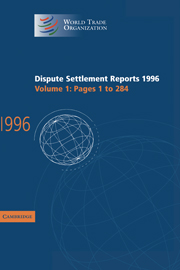Book contents
- Frontmatter
- Contents
- United States – Standards for Reformulated and Conventional Gasoline, complaints by Venezuela (WT/DS2) and Brazil (WT/DS4): Report of the Appellate Body
- United States – Standards for Reformulated and Conventional Gasoline, complaints by Venezuela (WT/DS2) and Brazil (WT/DS4): Report of the Panel
- European Communities – Trade Description of Scallops, requests by Canada (WT/DS7), Peru (WT/DS12) and Chile (WT/DS14): Report of the Panel (Request by Canada)
- European Communities – Trade Description of Scallops, requests by Canada (WT/DS7), Peru (WT/DS12) and Chile (WT/DS14): Report of the Panel (Request by Peru and Chile)
- Japan – Taxes on Alcoholic Beverages, complaints by the European Communities (WT/DS8), Canada (WT/DS10) and the United States (WT/DS11): Report of the Appellate Body
- Japan – Taxes on Alcoholic Beverages, complaints by the European Communities (WT/DS8), Canada (WT/DS10) and the United States (WT/DS11): Report of the Panel
United States – Standards for Reformulated and Conventional Gasoline, complaints by Venezuela (WT/DS2) and Brazil (WT/DS4): Report of the Panel
Published online by Cambridge University Press: 22 December 2017
- Frontmatter
- Contents
- United States – Standards for Reformulated and Conventional Gasoline, complaints by Venezuela (WT/DS2) and Brazil (WT/DS4): Report of the Appellate Body
- United States – Standards for Reformulated and Conventional Gasoline, complaints by Venezuela (WT/DS2) and Brazil (WT/DS4): Report of the Panel
- European Communities – Trade Description of Scallops, requests by Canada (WT/DS7), Peru (WT/DS12) and Chile (WT/DS14): Report of the Panel (Request by Canada)
- European Communities – Trade Description of Scallops, requests by Canada (WT/DS7), Peru (WT/DS12) and Chile (WT/DS14): Report of the Panel (Request by Peru and Chile)
- Japan – Taxes on Alcoholic Beverages, complaints by the European Communities (WT/DS8), Canada (WT/DS10) and the United States (WT/DS11): Report of the Appellate Body
- Japan – Taxes on Alcoholic Beverages, complaints by the European Communities (WT/DS8), Canada (WT/DS10) and the United States (WT/DS11): Report of the Panel
Summary
INTRODUCTION
On 23 January 1995, the United States received a request from Venezuela to hold consultations under Article XXII:1 of the General Agreement on Tariffs and Trade 1994 (“General Agreement”), Article 14.1 of the Agreement on Technical Barriers to Trade (“TBT Agreement”) and Article 4 of the Understanding on Rules and Procedures Governing the Settlement of Disputes (“DSU”), on the rule issued by the Environmental Protection Agency on 15 December 1993, entitled “Regulation of Fuels and Fuel Additives - Standards for Reformulated and Conventional Gasoline” (WT/DS2/1). The consultations between Venezuela and the United States took place on 24 February 1995. As they did not result in a satisfactory solution of the matter, Venezuela, in a communication dated 25 March 1995, requested the Dispute Settlement Body (“DSB”) to establish a panel to examine the matter under Article XXIII:2 of the General Agreement and Article 6 of the DSU (WT/DS2/2). On 10 April 1995, the DSB established a panel in accordance with the request made by Venezuela. On 28 April 1995, the parties to the dispute agreed that the Panel should have standard terms of reference (DSU, Art. 7) and agreed on the composition of the Panel as follows:
Chairman: Mr. Joseph Wong
Members: Mr. Crawford Falconer
Mr. Kim Luotonen
On 10 April 1995, Brazil requested the United States to hold consultations under Article XXII:1 of the General Agreement, Article 14.1 of the TBT Agreement and Article 4 of the DSU on the rule issued by the Environmental Protection Agency on 15 December 1993 entitled “Regulation on Fuels and Fuel Additives - Standards for Reformulated and Conventional Gasoline” (WT/DS4/1). Consultations between Brazil and the United States were held on 1 May 1995 without resulting in a satisfactory solution of the matter. In a communication dated 19 May 1995, Brazil requested the DSB to establish a panel to examine the matter pursuant to Article XXIII of the General Agreement, Article 14 of the Agreement on Technical Barriers to Trade and Article 6 of the DSU. On 31 May 1995, the DSB established a Panel in accordance with the request made by Brazil.
- Type
- Chapter
- Information
- Dispute Settlement Reports 1996 , pp. 29 - 88Publisher: Cambridge University PressPrint publication year: 2000
- 2
- Cited by

